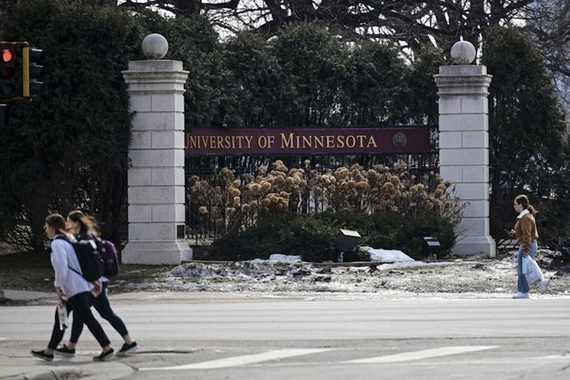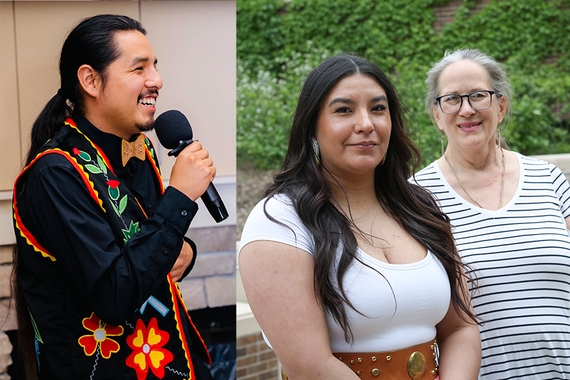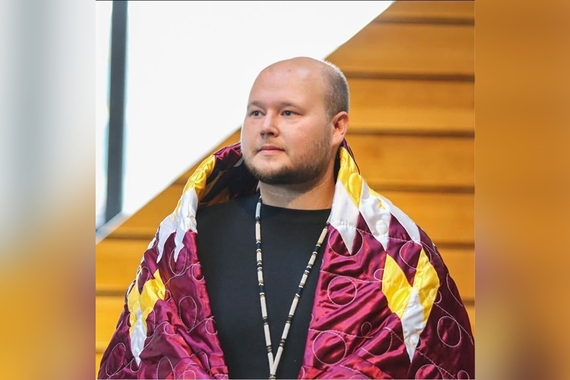Statement of the Department of American Indian Studies on the TRUTH Report and Demands
Statement
The Department of American Indian Studies (AIS) fully endorses the TRUTH Report and calls upon the University community and the public to join us in demanding that the Board of Regents (BOR) and upper administration take immediate action to stop and repair the University of Minnesota’s historic and ongoing harm that continues to be perpetrated against Dakota, Ojibwe, Ho-Chunk, and other American Indian and Indigenous peoples of this area.
As members of a department whose academic mission is to advance the critical and applied study of American Indians and Indigenous Peoples, we are not surprised at the Report’s disturbing findings, though we are anxious to see how UMN’s highest leaders will respond especially to the Report’s recommendations for reparations to American Indians and what changes it will make to fix festering problems within American Indian communities on campus. President Joan Gabel’s departure and BOR Chair Ken Powell’s resignation should not detract from the Report, nor should the void in their absence be an excuse to delay action called for by the Report. Tellingly, the complete absence of the Report in the BOR’s recent delineation of the process and criteria to be followed in selecting an interim President is utterly unacceptable when its recommendations should actually drive the process of vetting and selecting the next leaders.
Though we are not surprised at the TRUTH Report’s general findings, we are pleased to see details that it provides about the link between the founding and growth of the University as an integral part of settler society and wealth inequality on the one hand, and theft of land and genocide by the settler state on the other. To put it bluntly, the University’s very existence, and the wealth and assets that it has secured for itself “in perpetuity,” according to its land grant mission, are in fact predicated on perpetual violence against Native people currently living in Minnesota and those historically expelled by force and fiat outside the state’s boundaries.
The University’s historical preoccupation with ensuring the perpetual payout from theft and genocide is exemplified in the well-endowed Permanent University Fund or PUF that is jointly controlled by the BOR and the State of Minnesota but whose management is not transparent. In connecting the PUF to land dispossession, genocide, and accumulation of wealth in support of settler colonialism in Minnesota, the Report has also identified a source of money to now fund in perpetuity a number of activities, programs, and personnel to the benefit of Dakota, Ojibwe, and Ho-Chunk peoples as a matter of reparative justice, equity, and moral if not legal obligation and responsibility.
Our department was born out of student organizing efforts in the 1960s to respond to the demands of a growing American Indian student population and the activism of the Twin Cities’ American Indian community. The department is the oldest of its kind in the country with autonomous department status. In 1969, a report to the BOR stressed the need to establish links between the University and Minnesota’s eleven federally recognized tribes to develop recruitment and retention efforts for American Indian students, and to create courses on issues of importance to American Indian communities, issues that persist and are reflected in and reflective of the TRUTH report. Because of how we are implicated in this ongoing story, we issue the following demands:
Demands
Tuition and Fee waivers for Community Language Learning in Dakota and Ojibwe for all Dakota and Ojibwe language students (undergraduate and graduate; degree-seeking or non-degree seeking), regardless of tribal enrollment or residency status, with administrative assistance and support.
Dakota is an endangered language, and its study attracts students, both Native and non-Native, who are capable of working to renew the language. Two years of funding from the Mellon Minnesota Transform grant demonstrated the chronic underfunding—lack of sufficient instructional capacity and administrative support—for community language learning. The UMN Senior Citizen Education Program and the PSEO (Post-Secondary Enrollment Option) offer compelling models for waiving tuition for the communities. Both are established by Minnesota statutes.
Tuition and Fee waivers, regardless of financial need, for any courses relating to Ochethi Šakówiŋ studies for all students (undergraduate and graduate; degree-seeking or non degree seeking), regardless of tribal enrollment or residency status, with administrative assistance and support.
Many students taking language courses have expressed that they wished other non-language courses in Ochethi Šakówiŋ studies be available at no cost, as a matter of raising historical, political, and cultural awareness of Minnesota’s original people.
Fund Dakota and Ojibwe Language Immersion Houses and Resource Allocation for Teaching and Admin support for Language Nests
We demand student family housing for Dakota and Ojibwe language immersion houses and resource allocation for teaching and administrative support for language nests. Language immersion through group residence is a powerful method for language revitalization, community rebuilding, and kin-making, all of which are essential for our students to thrive.
Permanent Infrastructure Support for the Ojibwe People's Dictionary
The Ojibwe People's Dictionary (https://ojibwe.lib.umn.edu) is the most-used Ojibwe dictionary in the US or Canada with more than 50,000 unique monthly visitors using the Dictionary to support language reclamation efforts. Despite original partnership support from ULibraries and significant grant funding (MN Legacy Grant, NSF, and MN Indian Affairs Council) when developed and launched in 2012, the University has broken its service level agreement with the Dictionary, made web development platform and interface changes, and changed the design structure of the database without the consent or collaboration of Ojibwe faculty, linguists, or the American Indian studies department. The functional repairs to the database and editorial
interface are jeopardized by the University's continued disinvestment in an editor position. A target-of-opportunity hire of an Ojibwe linguist in a tenure-track faculty position (shared between Linguistics and American Indian Studies) is needed to ensure the continued availability of this crucial language resource.
Administrative Staff solely dedicated to AIS Dept and Center programming
Remove AIS from Scott Hall “hub” administration: we need and deserve a full-time administrator, financial preparer, curriculum coordinator, outreach coordinator, events planner, graduate studies coordinator, and other staff for the department and center.
Departmental Control and Accountability over the Dakota Language Program and the PUF-AIS Chair Endowment Fund
The Dakota Language Program and the PUF Chair Endowment are major sources of program funding that were created by state law for the purposes of advancing the department’s academic mission, yet the department does not have administrative control over these funds. For over a decade, CLA has drawn from DLP funds to use for “recurring” costs of salaries and fringe for Ojibwe and Dakota Language instructors, diverting these funds from its original intent and against what we believe is the University’s moral and ethical obligation to provide Ojibwe and Dakota language instruction. By so drawing from the DLP and therefore reducing financial resources for Dakota programming other than Instruction, the college is in effect forcing us to prioritize between salaries for language instructors and resources for language programming.
Indigeneity, Sovereignty, and Relationality
We demand that Indigeneity, Sovereignty, and Relationality occupy the same policy power and visibility in the University alongside Diversity, Equity, Access, and Inclusion. Sovereignty recognizes historical and political status differences born from treaty and compact negotiations, rights, entitlements, obligations, and responsibilities to Indigenous nations. Indigeneity recognizes the specific claims, conditions, positionalities, and analytics of original belonging to specific places. And Relationality recognizes the relations of kinship and mutual caregiving between humans and all life forms, including lands/waters/and skies. Indigeneity, Sovereignty, and Relationality are different from and transform DEAI practices.
Vice President for Indigenous Affairs
We demand the creation of the Office of Vice President for Indigenous Affairs. Such offices exist in universities in Aotearoa/New Zealand to carry out commitments to Maori and Indigenous Pacific Peoples. This shows real commitment to change and real attention to the subject matter of Indigenous nationhood and sovereignty. Among other responsibilities, this office’s function would be to operationalize Indigeneity, Sovereignty, and Relationality accordingly and appropriately, and to transform policies and practices concerning the return of cultural and patrimonial materials to their proper origins and peoples.
Dakota and Ojibwe Regents
We demand permanent seats for Dakota and Ojibwe regents in the BOR. Policy that directly and indirectly affects Dakota and Ojibwe needs and interests in higher education—and those of the broader and larger sector of Minnesota’s citizenry—should no longer be monopolized and controlled exclusively by the class that benefited and prospered through the dispossession, removal, and genocide of this region’s Native people.
We demand immediate location of a suitable building, to be renovated as needed, from PUF funding. We are past tired of being housed in the basement of a building that is hazardous, uninviting, and insufficient to meet our needs. The time is long overdue for a central and prominent space at UMN-TC for faculty, students, and community members to engage in research and share ideas in ways that advance knowledge about the history, cultures, languages, laws, and lands/waters/skies of the eleven federally recognized tribes within Minnesota, and of other American Indians and Indigenous people of North America and the world. Foundational principles of the center are to honor the persistence of the Dakota people on whose homeland the University of Minnesota-Twin Cities campus was founded, to elevate the University as a national center for excellence in American Indian education and research and a leader in comparative and global Indigenous studies, and to make the University a strong partner in the vitalization of Native nation-building through research excellence, teaching, and relative-making.
We demand a building, separate from the Native Nations Sovereignty Center and appropriate to Ochethi Šakówiŋ aesthetics and values, that provides a location for Ochethi Šakówiŋ studies and immersive language study, as well as permanent classrooms and community gathering space. The building would house a Dakota Language Nest for early childhood education (currently located in the Institute for Early Childhood Development) and would also facilitate outreach with Ochethi Šakówiŋ community members more broadly, serving as a cultural hub for language revitalization work. The Ochethi Šakówiŋ Center, in partnership with the Dakota Immersion House, would serve as a regional destination for language study, where people may collaborate and support one another’s learning face-to-face. The Center would work in partnership with other local and regional institutions, including the Minneapolis American Indian Center, Zani Otunwe and Hohwozu Otunwe. While the Center would be primarily non-residential, we would hope to house families who are engaged in either AIS or Ochethi Šakówiŋ (including Dakota language) studies. Shakopee Mdewakanton’s Hocokata Ti exemplifies such a Dakota-centered building that supports the local Dakota community but also serves to educate the settler public.
AIS is the first Native American Studies department in the United States, and the University has produced more PhDs working in Indigenous Studies than any other university in the membership list of the Native American and Indigenous Studies Association (NAISA), the world’s largest professional association of scholars in the academic field of Native Studies. All of this has happened without a PhD program at UMN. Without our own PhD program, we have no control over graduate admissions except for those of us whose appointments are lodged in the disciplines with their own PhD programs. As well, we cannot guide the curriculum our students are able to take except at the margins (where it might fit within disciplinary training) or through our graduate minor in American Indian and Indigenous Studies. Further, without a graduate program we do not have access to or control over graduate student teaching assistants to support and potentially expand our undergraduate courses and programs. AIS faculty are doing an enormous amount of unacknowledged labor for other departments while also playing leadership roles in developing and evolving Indigenous Studies as an academic field. We have a robust and stellar assemblage of core and affiliated faculty who are nationally and internationally renowned, while the rapidly growing list of enrollees in our graduate minor degree among PhD students in the UMN system demonstrates strong demand. From polling, we estimate that almost half of the students who are enrolled in PhD programs across the system who also have primary research interests in Native studies would have applied into our PhD program if we had one that is adequately funded. This begins with strong financial and support packages for graduate students to be competitive (surpass competition) with our peers.
The foundation of our Ojibwe and Dakota BA programs is language competence and mastery, yet three of four faculty who oversee the programs do not hold tenure-stream positions with the authority, rights, security, benefits, and entitlements that come with tenure-stream employment; Timeline promise to make instructional and research support and resources available for the creation of Ho-Chunk language and studies. A commitment to fix the University’s role in the damage to the cultures and languages of this place must provide permanent support for Indigenous language research and instruction as a bona fide area of engaged academic excellence.
We demand tuition waivers for all American Indian students similar to the tuition waivers available at the Morris campus. This includes full fellowships for American Indian graduate (PhD, MS, MA, MHSPH, and Professional) students across campus.
Tuition and Fee waivers for Community Language Learning in Dakota and Ojibwe for all Dakota and Ojibwe language students (undergraduate and graduate; degree-seeking or non-degree seeking), regardless of tribal enrollment or residency status, with administrative assistance and support.


